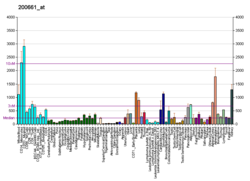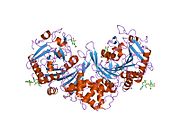Cathepsin A is an enzyme that is classified both as a cathepsin and a carboxypeptidase. In humans, it is encoded by the CTSA gene. [5]
Function
This gene encodes a glycoprotein that associates with lysosomal enzymes beta-galactosidase and neuraminidase to form a complex of high-molecular-weight multimers. The formation of this complex provides a protective role for stability and activity. It is protective for β-galactosidase and neuraminidase. [6]
Clinical significance
Deficiencies in this gene are linked to multiple forms of galactosialidosis. [5]
Interactions
Cathepsin A has been shown to interact with NEU1. [7]
References
- ^ a b c GRCh38: Ensembl release 89: ENSG00000064601 – Ensembl, May 2017
- ^ a b c GRCm38: Ensembl release 89: ENSMUSG00000017760 – Ensembl, May 2017
- ^ "Human PubMed Reference:". National Center for Biotechnology Information, U.S. National Library of Medicine.
- ^ "Mouse PubMed Reference:". National Center for Biotechnology Information, U.S. National Library of Medicine.
- ^ a b "Entrez Gene: CTSA cathepsin A".
- ^ Mitchell, Richard Sheppard; Kumar, Vinay; Robbins, Stanley L.; Abbas, Abul K.; Fausto, Nelson (2007). "Table 7-6". Robbins basic pathology (8th ed.). Saunders/Elsevier. ISBN 978-1-4160-2973-1.
- ^ van der Spoel, A; Bonten E; d'Azzo A (Mar 1998). "Transport of human lysosomal neuraminidase to mature lysosomes requires protective protein/cathepsin A". EMBO J. 17 (6). ENGLAND: 1588–97. doi: 10.1093/emboj/17.6.1588. ISSN 0261-4189. PMC 1170506. PMID 9501080.
Further reading
- Morreau H, Galjart NJ, Willemsen R, et al. (1992). "Human lysosomal protective protein. Glycosylation, intracellular transport, and association with beta-galactosidase in the endoplasmic reticulum". J. Biol. Chem. 267 (25): 17949–56. doi: 10.1016/S0021-9258(19)37135-2. PMID 1387645.
- Halal F, Chitayat D, Parikh H, et al. (1992). "Ring chromosome 20 and possible assignment of the structural gene encoding human carboxypeptidase-L to the distal segment of the long arm of chromosome 20". Am. J. Med. Genet. 43 (3): 576–9. doi: 10.1002/ajmg.1320430314. PMID 1605251.
- Jackman HL, Tan FL, Tamei H, et al. (1990). "A peptidase in human platelets that deamidates tachykinins. Probable identity with the lysosomal "protective protein"". J. Biol. Chem. 265 (19): 11265–72. doi: 10.1016/S0021-9258(19)38586-2. PMID 1694176.
- Zhou XY, Galjart NJ, Willemsen R, et al. (1992). "A mutation in a mild form of galactosialidosis impairs dimerization of the protective protein and renders it unstable". EMBO J. 10 (13): 4041–8. doi: 10.1002/j.1460-2075.1991.tb04980.x. PMC 453152. PMID 1756715.
- Galjart NJ, Morreau H, Willemsen R, et al. (1991). "Human lysosomal protective protein has cathepsin A-like activity distinct from its protective function". J. Biol. Chem. 266 (22): 14754–62. doi: 10.1016/S0021-9258(18)98751-X. PMID 1907282.
- Yoshida K, Oshima A, Shimmoto M, et al. (1991). "Human beta-galactosidase gene mutations in GM1-gangliosidosis: a common mutation among Japanese adult/chronic cases". Am. J. Hum. Genet. 49 (2): 435–42. PMC 1683306. PMID 1907800.
- Wiegant J, Galjart NJ, Raap AK, d'Azzo A (1991). "The gene encoding human protective protein (PPGB) is on chromosome 20". Genomics. 10 (2): 345–9. doi: 10.1016/0888-7543(91)90318-9. PMID 2071143.
- Strisciuglio P, Sly WS, Dodson WE, et al. (1991). "Combined deficiency of beta-galactosidase and neuraminidase: natural history of the disease in the first 18 years of an American patient with late infantile onset form". Am. J. Med. Genet. 37 (4): 573–7. doi: 10.1002/ajmg.1320370431. PMID 2148053.
- Kase R, Itoh K, Takiyama N, et al. (1990). "Galactosialidosis: simultaneous deficiency of esterase, carboxy-terminal deamidase and acid carboxypeptidase activities". Biochem. Biophys. Res. Commun. 172 (3): 1175–9. doi: 10.1016/0006-291X(90)91572-A. PMID 2244901.
- Willemsen R, Hoogeveen AT, Sips HJ, et al. (1986). "Immunoelectron microscopical localization of lysosomal beta-galactosidase and its precursor forms in normal and mutant human fibroblasts". Eur. J. Cell Biol. 40 (1): 9–15. PMID 3084261.
- Verheijen FW, Palmeri S, Galjaard H (1987). "Purification and partial characterization of lysosomal neuraminidase from human placenta". Eur. J. Biochem. 162 (1): 63–7. doi: 10.1111/j.1432-1033.1987.tb10542.x. PMID 3102233.
- Nanba E, Tsuji A, Omura K, Suzuki Y (1987). "Galactosialidosis: a direct evidence that a 46-kilodalton protein restores deficient enzyme activities in fibroblasts". Biochem. Biophys. Res. Commun. 144 (1): 138–42. doi: 10.1016/S0006-291X(87)80486-2. PMID 3107551.
- Galjart NJ, Gillemans N, Harris A, et al. (1988). "Expression of cDNA encoding the human "protective protein" associated with lysosomal beta-galactosidase and neuraminidase: homology to yeast proteases". Cell. 54 (6): 755–64. doi: 10.1016/S0092-8674(88)90999-3. PMID 3136930. S2CID 21504892.
- Chitayat D, Applegarth DA, Lewis J, et al. (1989). "Juvenile galactosialidosis in a white male: a new variant". Am. J. Med. Genet. 31 (4): 887–901. doi: 10.1002/ajmg.1320310423. PMID 3149149.
- Verheijen FW, Palmeri S, Hoogeveen AT, Galjaard H (1985). "Human placental neuraminidase. Activation, stabilization and association with beta-galactosidase and its protective protein". Eur. J. Biochem. 149 (2): 315–21. doi: 10.1111/j.1432-1033.1985.tb08928.x. PMID 3922758.
- van der Horst GT, Kleijer WJ, Hoogeveen AT, et al. (1984). "Morquio B syndrome: a primary defect in beta-galactosidase". Am. J. Med. Genet. 16 (2): 261–75. doi: 10.1002/ajmg.1320160215. PMID 6418007.
- Maire I, Nivelon-Chevallier AR (1982). "Combined deficiency of beta-galactosidase and neuraminidase: three affected siblings in a French family". J. Inherit. Metab. Dis. 4 (4): 221–3. doi: 10.1007/BF02263656. PMID 6796775. S2CID 38676707.
- Pshezhetsky AV, Potier M (1994). "Direct affinity purification and supramolecular organization of human lysosomal cathepsin A.". Arch. Biochem. Biophys. 313 (1): 64–70. doi: 10.1006/abbi.1994.1359. PMID 8053688.
- Ishii N, Oshima A, Sakuraba H, et al. (1994). "Normal serum beta-galactosidase in juvenile GM1 gangliosidosis". Pediatr. Neurol. 10 (4): 317–9. doi: 10.1016/0887-8994(94)90129-5. PMID 8068159.
- Chakraborty S, Rafi MA, Wenger DA (1994). "Mutations in the lysosomal beta-galactosidase gene that cause the adult form of GM1 gangliosidosis". Am. J. Hum. Genet. 54 (6): 1004–13. PMC 1918177. PMID 8198123.
External links
- Cathepsin+A at the U.S. National Library of Medicine Medical Subject Headings (MeSH)






